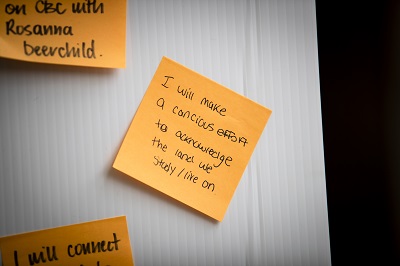Although there were many learnings for the Ivey community members who participated in Truth and Reconciliation activities throughout this week, one of the most significant was the need to keep reconciliation going.
“Beyond today, I hope we all carry forward a deeper understanding of the historical and ongoing injustices that Indigenous Peoples face, and a commitment to take action to support Indigenous communities, especially as future business leaders,” said Kelly Liu, an HBA ’23 candidate and Vice President of Equity, Diversity, and Inclusion (EDI) for the Ivey HBA Association (HBAA). “As students who attend classes at the Ivey building every day, it is important to recognize the privilege we hold in being able to study, make connections, form friendships, and create lasting memories on land that does not belong to us.”
Truth and Reconciliation activities at Ivey
Liu and the HBAA team, as well as student leaders with the MSc Association and the MBA Association, helped to make Ivey students aware of the many ways they could honour the National Day for Truth and Reconciliation. This included wearing orange t-shirts or ribbons to honour survivors of residential schools and commemorate those who never returned. Another important activity was the opportunity to reflect on ways they can personally commit to practicing reconciliation. Ivey students, staff, and faculty were encouraged to share their reflections and commitments either digitally through an online form or on display boards with orange Post-it notes throughout the Ivey building.
Stu Macdonald, an HBA ’24 candidate, participated in the reflection activity and shared that he had committed to making a conscious effort to acknowledge the land he studies and lives on.
“As a student, I was happy to see that there were ways we [students] could participate,” he said.
Advancing reconciliation efforts one step at a time
There were many other commitments shared anonymously, ranging from learning more about Indigenous experiences to getting involved in initiatives that promote Indigenous inclusion. Here are some examples:
- Read and learn from the Truth and Reconciliation Commission's Calls to Action;
- Go to Indigenous learning events;
- Read at least three books by Indigenous writers;
- Become more knowledgeable;
Practicing reconciliation means restoring friendship and harmony amongst communities."
- Ensure my children learn about colonization and residential schools;
- Commit to giving land acknowledgments and understanding why;
- Reflect on my role as a settler and educate, amplify, and support actions required to further plans for reconciliation;
- Learn from survivors' stories;
I am reading the Truth and Reconciliation report, specifically the survivor stories. I started this process when the first children were discovered on the grounds of the residential schools. I will reflect on and discern their stories in order to better educate myself."
- Put in place recruitment and hiring practices that increase access to jobs and join industry associations that promote the inclusion of Indigenous-led organizations;
- Listen to Indigenous leaders and make space for their voices;
- Learn more about the stories of the underrepresented groups and promote equal opportunities;
- Commit to being a non-Indigenous ally;
Practicing reconciliation to me means understanding the history of Indigenous and non-Indigenous people in Canada, acknowledging the harm that occurred, and making a commitment to right wrongs and change behaviour moving forward to be able to achieve mutually respective Indigenous and non-Indigenous relations."
- Voice against inequality and injustice;
- Be mindful of the systemic racism and structural inequalities that Indigenous Peoples face; and,
- Connect my head to my heart.
To keep the momentum going, the contributed commitments will be turned into specific actions for the Ivey community to take through a larger project.
In addition to sharing their reflections and commitments, the Ivey community was encouraged to incorporate land acknowledgements into activities or participate in the numerous events and programs that Western’s Office of Indigenous Initiatives (OII) offered throughout the week.



